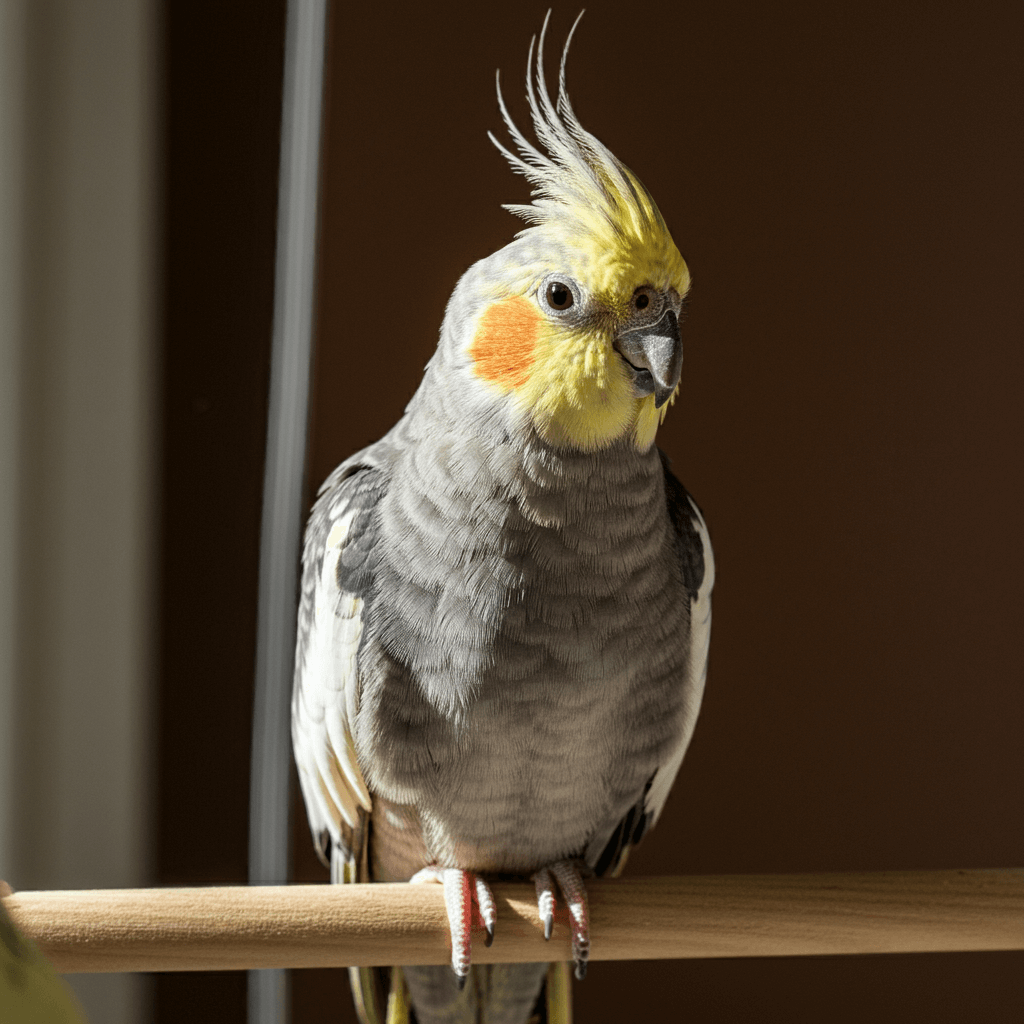What is Cockatiel Stress?
Cockatiel stress occurs when your bird experiences anxiety or discomfort due to changes in its environment, routine, or health. Just like humans, cockatiels can feel stressed when they’re exposed to unfamiliar or overwhelming situations. Recognizing stress in your cockatiel is crucial for maintaining their well-being and preventing long-term behavioral issues.
Stress in cockatiels can be triggered by various factors such as loud noises, sudden changes in their surroundings, improper handling, or a lack of social interaction. If left unchecked, this stress can lead to physical and emotional problems, including feather plucking, reduced appetite, and even illness.
Understanding the signs of stress in cockatiels, such as unusual vocalizations, aggressive behavior, or excessive nervousness, helps you take action before it becomes a serious issue. By creating a calm and predictable environment for your bird, you can prevent stress and keep them healthy.
In the following sections, we’ll dive into common causes, signs, and how you can effectively treat and prevent stress in your cockatiel.
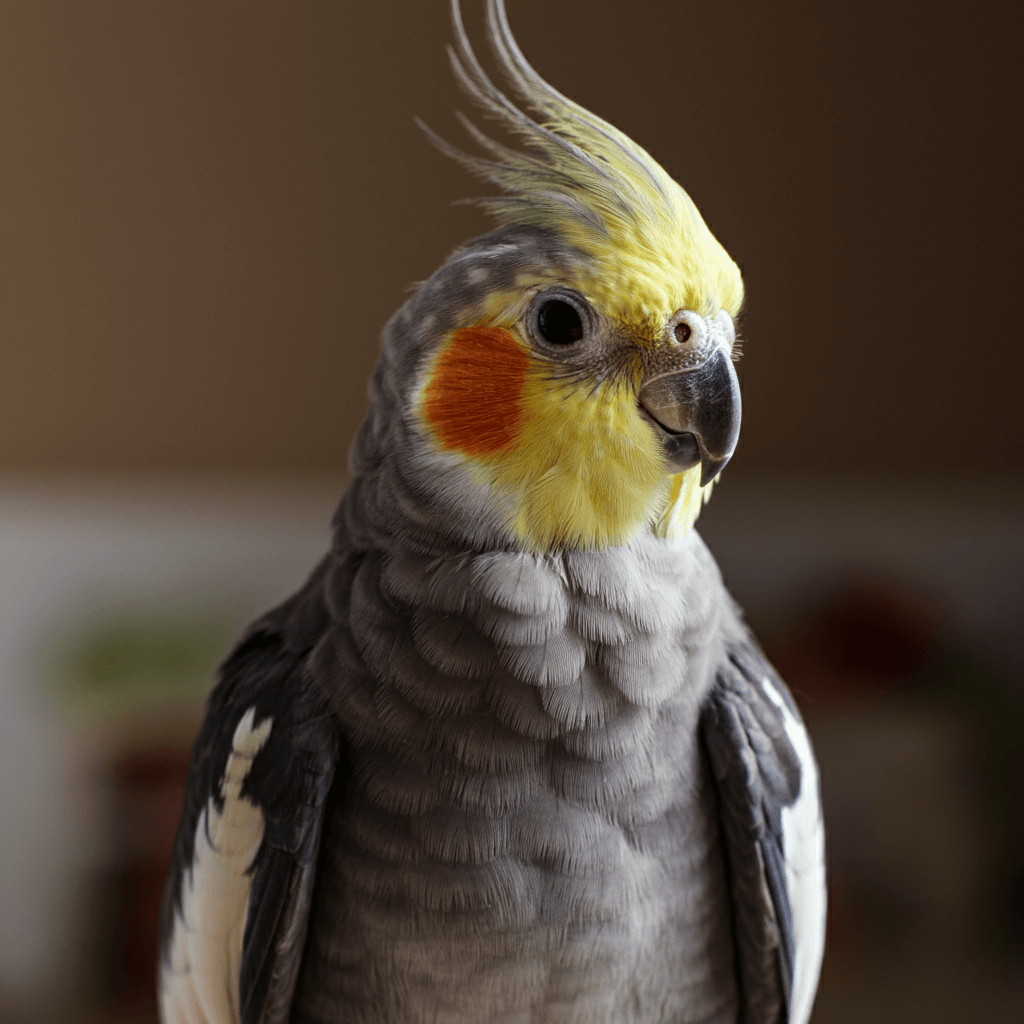
A cockatiel with a tense posture and wide eyes, early signs of stress or anxiety.
Common Causes of Stress in Cockatiels
Cockatiels, like many pet birds, can easily become stressed when their environment or routine changes. Understanding the common causes of stress in cockatiels helps you create a more comfortable and secure space for them.
1. Sudden Environmental Changes
One of the main triggers for cockatiel stress is sudden changes in their environment. Moving to a new location, rearranging furniture, or even shifting their cage can make your bird feel uneasy. Loud noises, such as thunderstorms, loud music, or vacuum cleaners, can also overwhelm cockatiels, leading to anxiety.
2. Lack of Social Interaction
Cockatiels are social creatures, and when they don’t receive enough attention or interaction, they can feel isolated and stressed. Improper handling, such as being grabbed too quickly or roughly, can also make your cockatiel nervous and defensive.
3. Boredom and Lack of Stimulation
Another common cause of stress is boredom. Without mental stimulation, such as toys or playtime, cockatiels can become frustrated, leading to negative behaviors like feather plucking or excessive screaming. A monotonous routine can also contribute to their stress levels.
4. Poor Diet and Improper Lighting
A poor diet and lack of proper lighting can affect your cockatiel’s physical health, which in turn leads to stress. A lack of natural light or an unbalanced diet can disrupt their internal systems, causing them to feel unwell and more stressed.
By recognizing these common causes of cockatiel stress, you can take steps to create a stable, engaging, and healthy environment for your bird, which will greatly reduce their stress levels.
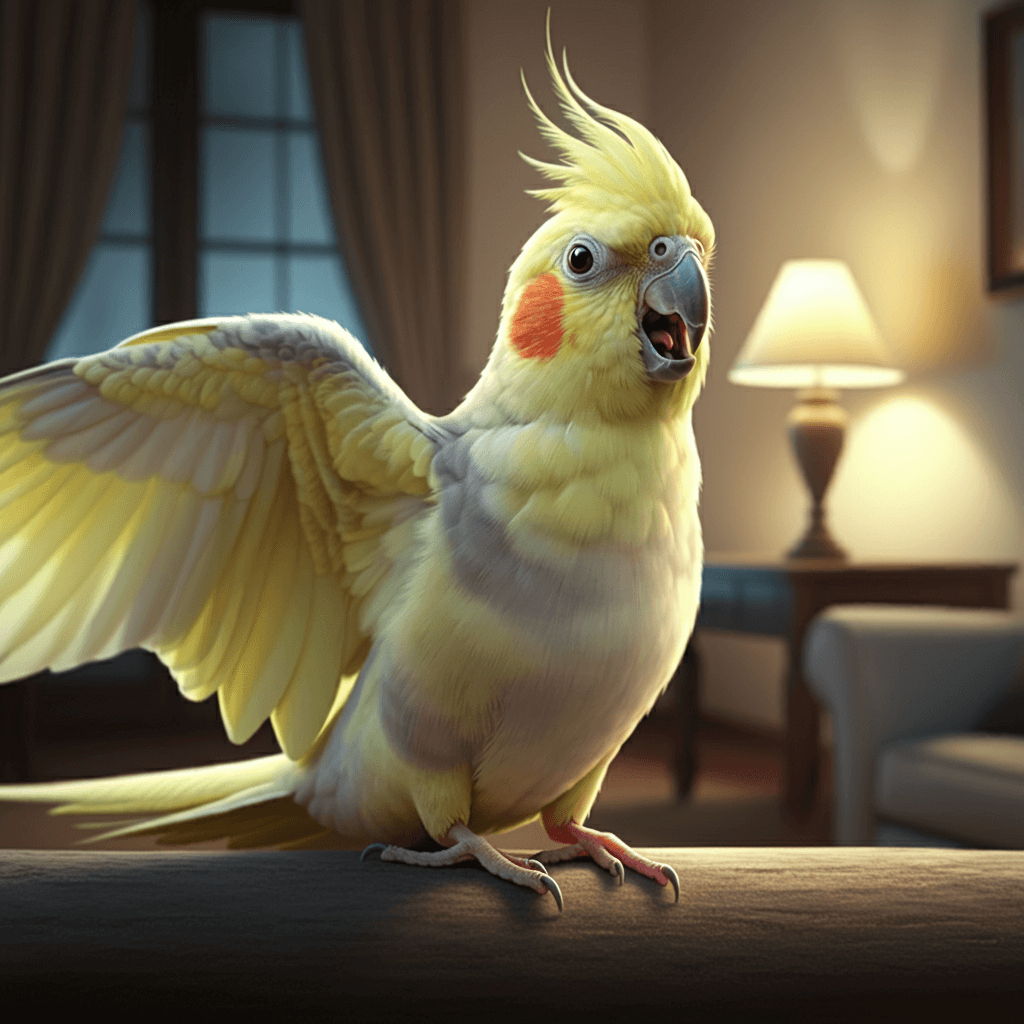
A cockatiel reacting to a loud noise, which can be a common cause of stress in pet birds, leading to erratic behavior.
Signs and Symptoms of Cockatiel Stress
Recognizing the signs of stress in cockatiels is essential to ensure your bird remains happy and healthy. Stress can manifest in various ways, from changes in behavior to physical symptoms, and identifying these early can prevent long-term problems.
1. Feather Plucking
One of the most noticeable signs of cockatiel stress is feather plucking. When a cockatiel feels anxious or uncomfortable, they may start pulling out their own feathers as a way to cope with stress. This behavior can lead to bald patches and skin irritation.
2. Unusual Vocalizations
Unusual vocalizations are another indicator. If your cockatiel is suddenly louder, quieter, or makes distressed sounds more frequently, this could signal they’re stressed. Excessive screeching, especially during times when they’re usually calm, often points to an underlying issue.
3. Behavioral Changes
Behavioral changes such as aggression or nervousness can also be symptoms of stress. A normally friendly cockatiel might become more defensive, biting or lunging at you when you try to interact. Conversely, a usually active bird might become withdrawn and lethargic.
4. Loss of Appetite and Weight Loss
Physical symptoms like loss of appetite and weight loss are also key indicators of stress. If your cockatiel refuses to eat or seems to lose interest in food, this could be a reaction to stress. In some cases, birds may even develop digestive issues or become ill due to ongoing anxiety.
5. Pacing or Excessive Movement
Finally, pacing or excessive movement around the cage, such as flying frantically or repeatedly moving back and forth, is a common sign of a stressed cockatiel. This restless behavior shows that they’re unable to settle or feel safe in their environment.
By keeping an eye out for these signs and symptoms, you can take quick action to help your cockatiel calm down, preventing stress from impacting their health in the long term.
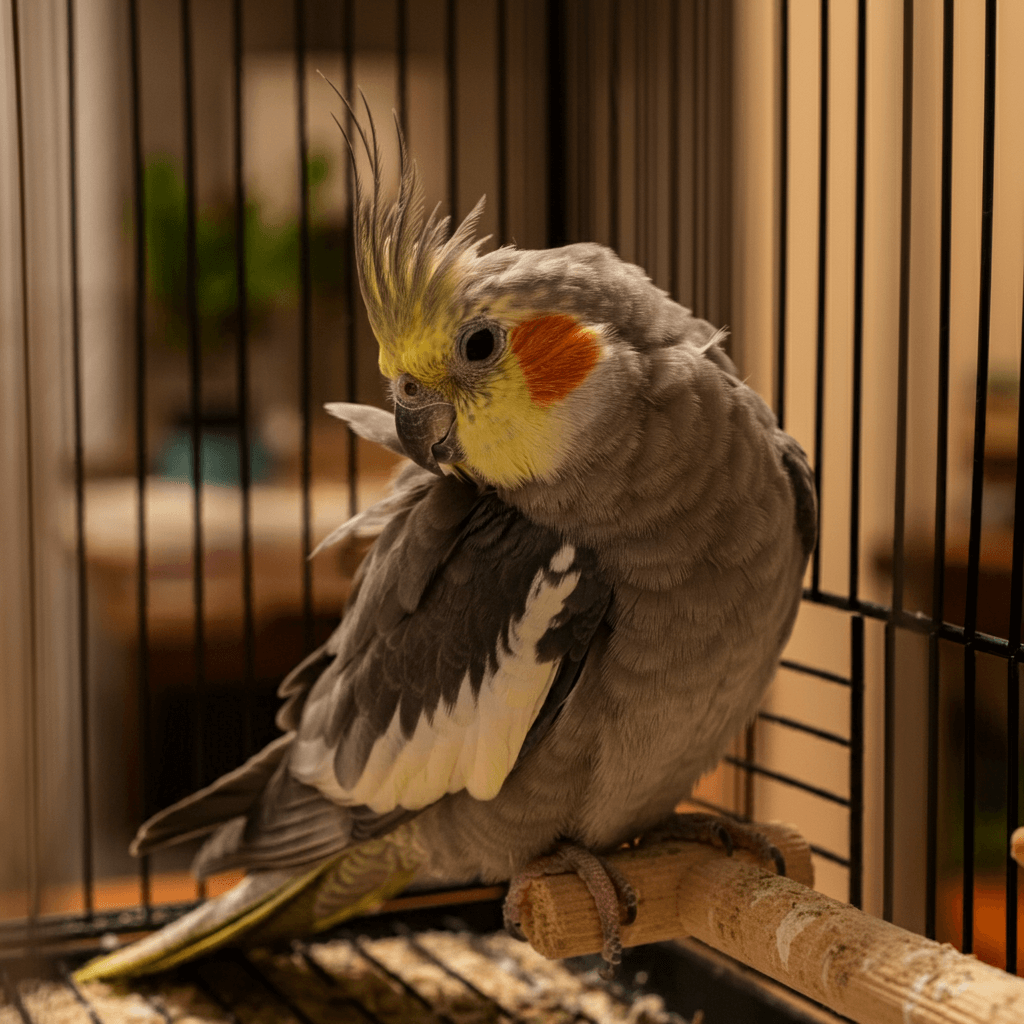
A cockatiel engaging in feather plucking, a common sign of extreme stress or anxiety in birds, often caused by environmental or social factors.
How to Prevent Stress in Cockatiels
Preventing stress in cockatiels is essential for their long-term health and happiness. Cockatiels are sensitive birds that can easily become anxious if their environment or routine isn’t ideal. Thankfully, there are several practical ways to prevent stress in your feathered friend.
1. Provide a Stable Environment
Cockatiels are creatures of habit, so they thrive when their surroundings and routines are predictable. Keep their cage in a quiet, familiar space away from loud noises and sudden disturbances. Avoid moving their cage frequently, as this can create anxiety.
2. Ensure Regular Social Interaction
Social interaction is key. Cockatiels are social birds, and they need regular attention and bonding time. If left alone for too long, they can feel isolated and stressed. Make time each day to interact with your cockatiel through gentle handling, talking, or play sessions. You can also consider adding another bird for companionship, but make sure they get along well.
3. Provide Mental Stimulation
Mental stimulation is equally important to prevent boredom-induced stress. Keep a variety of toys in their cage and rotate them regularly to keep your cockatiel engaged. Puzzle toys, chewable items, and foraging activities can keep them mentally sharp and prevent destructive behaviors.
4. Handle Your Cockatiel Properly
Proper handling plays a major role in reducing stress. Approach your cockatiel calmly and avoid sudden movements. Handling them gently and respectfully helps build trust, ensuring that they feel secure in your care.
5. Maintain a Balanced Diet and Proper Lighting
Good nutrition keeps your cockatiel physically healthy, which in turn helps prevent stress. Ensure they have access to fresh fruits, vegetables, and seeds, and give them plenty of natural light or full-spectrum lighting to regulate their mood and energy levels.
By ensuring your cockatiel has a stable, interactive, and engaging environment, you can successfully prevent stress and keep your bird calm and content.
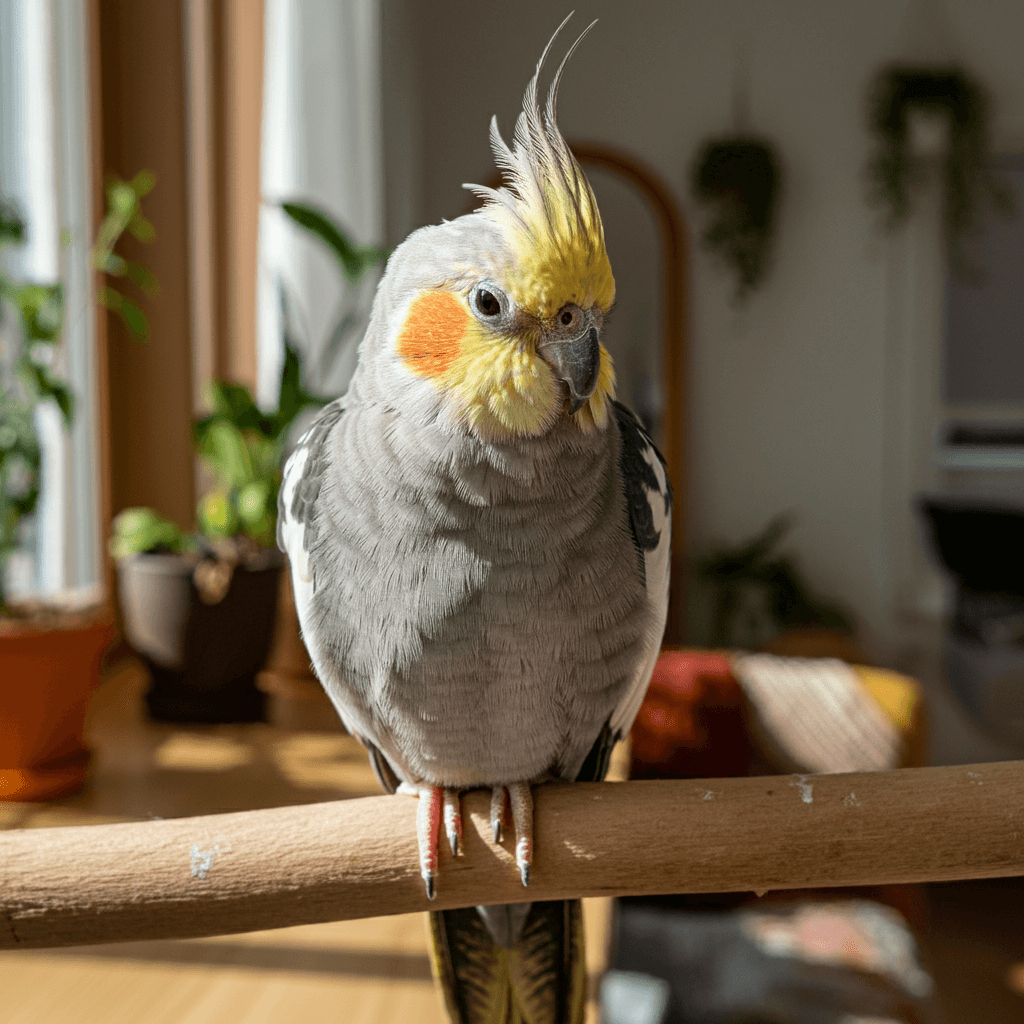
A cockatiel sitting calmly on its perch, a sign of a stress-free and content pet.
Effective Treatments for Cockatiel Stress
If your cockatiel is showing signs of stress, it’s important to address the issue promptly to prevent long-term health and behavioral problems. Here are some effective treatments for cockatiel stress that can help your bird return to a calm and relaxed state.
1. Identify and Remove Stress Triggers
The first step is to identify and remove stress triggers. This might include relocating their cage to a quieter spot, minimizing loud noises, or avoiding sudden changes in their environment. A calm, stable setting is crucial for helping your cockatiel feel safe and secure.
2. Increase Social Interaction
Cockatiels are social creatures and need regular attention to feel connected and secure. Spend time with your bird each day, talking to them, playing with them, and offering gentle physical interaction. If your cockatiel spends a lot of time alone, consider getting them a companion bird, as loneliness can be a major source of stress.
3. Provide Environmental Enrichment
Environmental enrichment is another effective way to reduce stress. Provide plenty of toys, perches, and activities to keep your bird mentally stimulated. Puzzle toys, foraging activities, and chewable items can help distract them from stressful situations and keep their minds engaged.
4. Create a Soothing Atmosphere
Sometimes, creating a soothing atmosphere can work wonders for a stressed cockatiel. Try playing soft, calming music or nature sounds to create a peaceful environment. Covering their cage partially at night or during stressful moments can also make them feel more secure.
5. Consult an Avian Veterinarian
If your cockatiel’s stress seems severe or persistent, it may be time to consult an avian veterinarian. They can rule out any underlying health issues that could be contributing to the stress and suggest further treatment options, such as supplements or behavior therapy.
By using these effective treatments, you can help your cockatiel overcome stress and ensure they stay happy and healthy. With the right care, your bird will soon feel more relaxed and comfortable in their environment.
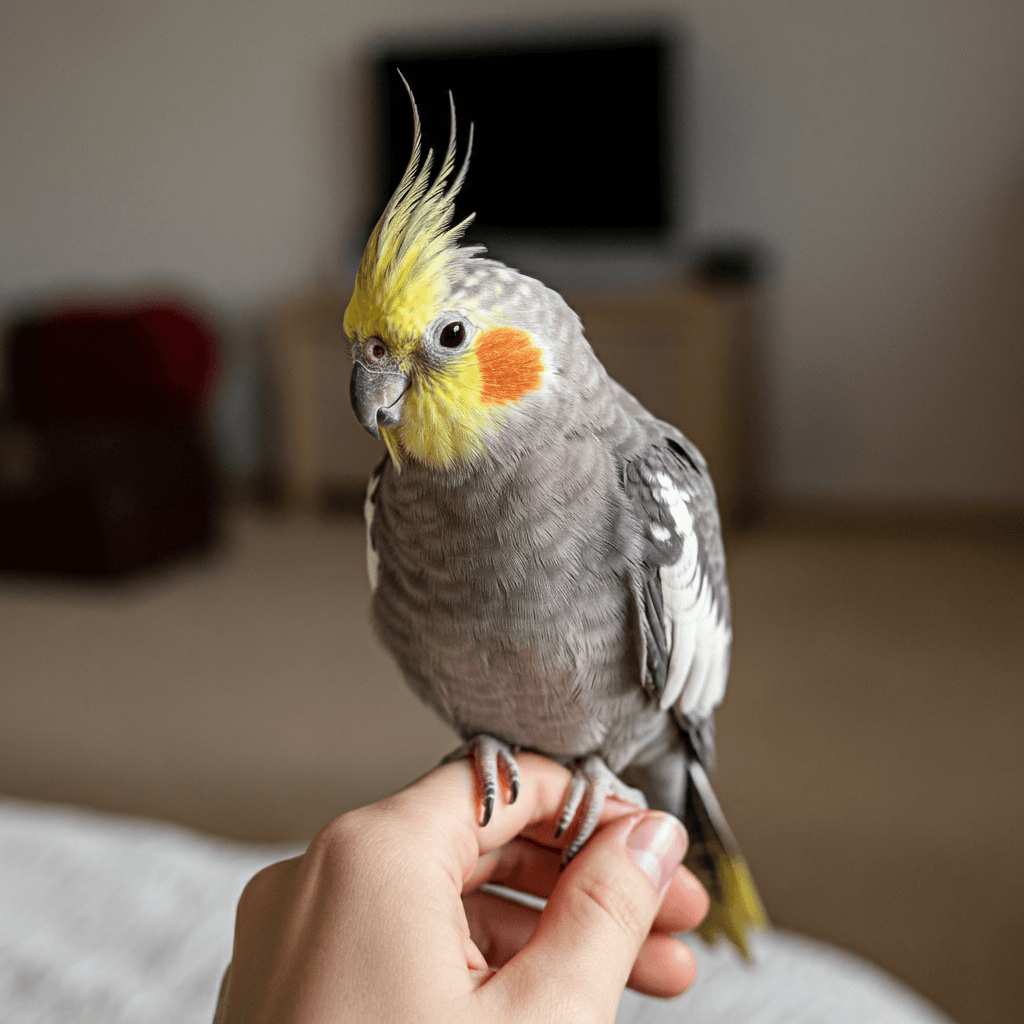
A cockatiel interacting with its owner, an important step in building trust and reducing stress in pet birds.
Environmental Changes to Reduce Cockatiel Stress
Making simple environmental changes can have a big impact on reducing cockatiel stress. Creating a calm, comfortable, and predictable space for your bird will help them feel more secure and less anxious.
1. Choose the Right Cage Placement
One of the first things to consider is where you place their cage. Cockatiels are sensitive to loud noises and sudden movements, so it’s important to keep their cage in a quiet, stable area. Avoid placing it near busy doorways, televisions, or windows where outside noise or activity might disturb them. A peaceful corner of the room, away from daily household traffic, is ideal.
2. Provide Access to Natural Light
Another key factor is ensuring that your cockatiel gets natural light. Exposure to sunlight helps regulate their mood and energy levels. If natural light is limited, consider using full-spectrum lighting that mimics daylight to keep your cockatiel healthy and stress-free.
3. Maintain Ideal Temperature and Air Quality
Temperature and air quality also play an important role. Cockatiels are comfortable in moderate temperatures, so avoid placing their cage near drafts, direct sunlight, or heaters. Clean, fresh air is essential, as poor air quality can cause discomfort and stress. Consider using an air purifier if the air in your home is stagnant or contains irritants like smoke or strong odors.
4. Add Environmental Enrichment
Adding environmental enrichment can make a huge difference in reducing stress. Cockatiels need mental stimulation to stay happy, so providing a variety of toys, perches, and activities is crucial. Rotate toys regularly to keep things fresh, and ensure your bird has enough space to stretch, move, and play.
5. Reduce Stress from Other Pets
Finally, if your cockatiel is in a multi-pet household, take steps to reduce interactions that might stress your bird. Cats, dogs, and other animals can make your cockatiel nervous, so limit their contact or place the cage out of reach to help your bird feel safe.
By making these simple environmental adjustments, you can significantly reduce your cockatiel’s stress and create a more peaceful, comfortable home for your feathered friend.
Behavioral Interventions for Cockatiel Stress
When dealing with cockatiel stress, behavioral interventions can be a highly effective way to reduce anxiety and help your bird feel more secure. These interventions focus on modifying your cockatiel’s behavior and building a stronger bond between you and your pet.
1. Positive Reinforcement Training
One of the most effective behavioral interventions is positive reinforcement training. By rewarding your cockatiel with treats or praise when they exhibit calm behavior, you encourage them to stay relaxed. This type of training helps reduce stress because it teaches your bird that positive experiences are associated with calm, relaxed actions.
2. Gradual Desensitization
Gradual desensitization is another useful technique. If your cockatiel is stressed by certain triggers, such as being handled or exposed to new environments, gradually introducing them to these stressors in small, manageable doses can help reduce their fear. Start by exposing your bird to the trigger for short periods, and slowly increase the time as they become more comfortable.
3. Maintain Predictable Routines
Creating predictable routines is essential for reducing cockatiel stress. Cockatiels thrive on structure, so maintaining regular feeding, playtime, and sleep schedules can help reduce anxiety. Birds feel more secure when they know what to expect, which leads to a calmer, more relaxed temperament.
4. Build Trust Through Gentle Interaction
Building trust through consistent, gentle interaction is also important. Spend time daily interacting with your cockatiel, but let them approach you at their own pace. Avoid forcing contact, as this can increase stress. Over time, your bird will feel more comfortable around you, reducing their overall anxiety levels.
5. Consult an Avian Behaviorist
Finally, if your cockatiel is showing signs of severe stress, consider consulting with an avian behaviorist. These specialists can help you develop a customized plan to address your bird’s specific behavioral issues, guiding you through more complex interventions if necessary.
By implementing these behavioral interventions, you can help your cockatiel manage stress in a healthy way, ensuring they stay calm and content in their daily life.
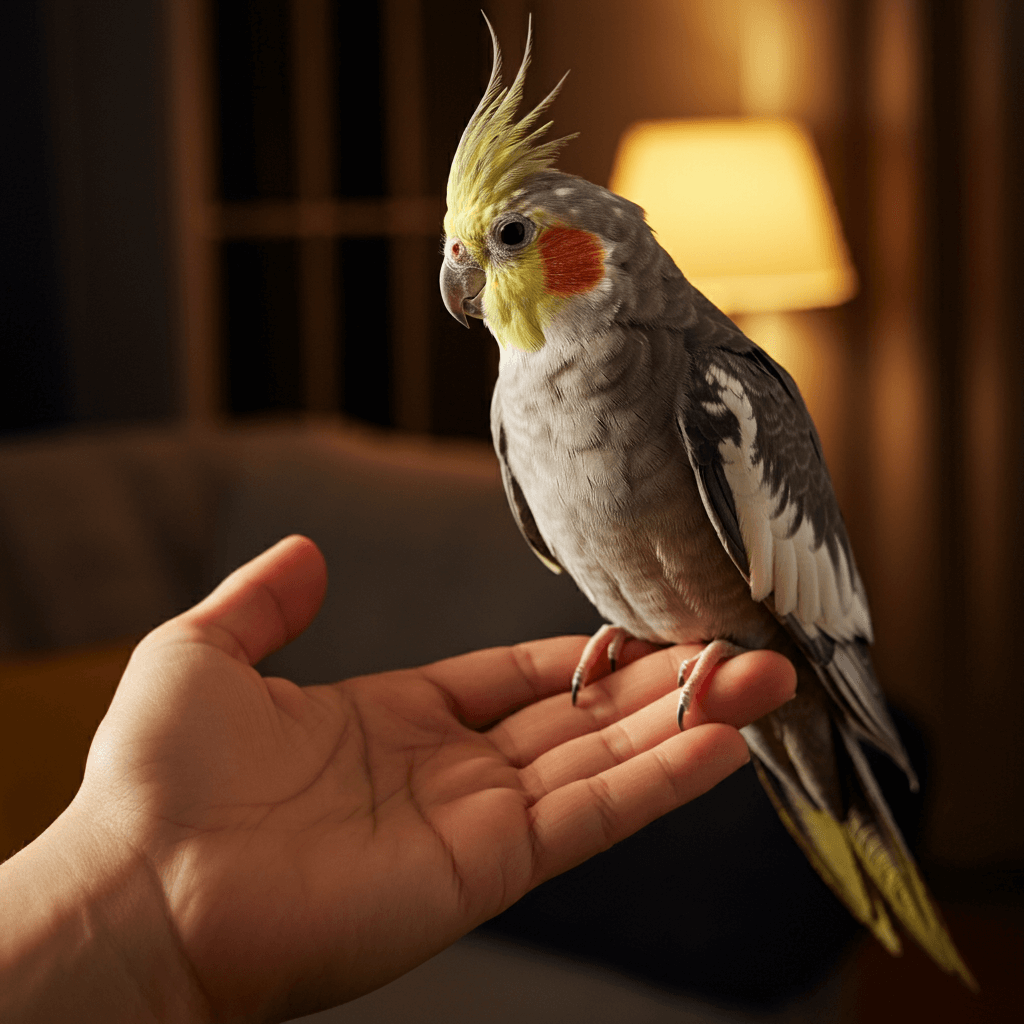
Training a cockatiel helps reduce stress by providing mental stimulation and building confidence in pet birds.
When to Consult a Veterinarian
While many cases of cockatiel stress can be managed at home through environmental changes and behavioral interventions, there are times when professional help is necessary. Recognizing when to consult a veterinarian is crucial for your bird’s well-being, especially if stress symptoms persist or worsen.
1. Excessive Feather Plucking or Self-Harm
One clear sign that it’s time to consult a vet is if your cockatiel starts feather plucking excessively or injures themselves. While mild stress may lead to some nervous grooming, continuous feather loss or self-harm is often a sign of deeper emotional or health issues that require expert attention.
2. Physical Symptoms like Weight Loss or Lethargy
Another reason to seek veterinary help is if your cockatiel shows physical symptoms like weight loss, lethargy, or loss of appetite. Stress can affect a bird’s immune system and lead to illness, so if your bird is not eating or seems unwell, it’s important to have them checked for underlying medical problems.
3. Persistent Behavioral Changes
If behavioral changes like aggression or withdrawal persist despite your efforts to reduce stress, a veterinarian or avian behaviorist can help. They can identify specific causes of stress that you might not have noticed and suggest advanced treatments or supplements to help calm your bird.
4. Lack of Improvement After Environmental and Behavioral Changes
If you’ve made environmental adjustments and tried behavioral interventions without seeing improvement, a vet visit can rule out any hidden health conditions that may be contributing to your cockatiel’s stress. Cockatiels are masters at hiding illness, so any prolonged stress should be taken seriously.
5. Early Intervention is Key
In short, if your cockatiel’s stress symptoms continue or worsen, it’s best to consult a veterinarian. Early intervention can prevent more serious health issues and ensure your bird gets the help they need to return to their happy, relaxed self.
Frequently Asked Questions (FAQs)
1. What are the most common signs of cockatiel stress?
Common signs of cockatiel stress include feather plucking, aggressive behavior, loss of appetite, and unusual vocalizations. You may also notice pacing, excessive movement, or a sudden withdrawal from interaction.
2. What causes stress in cockatiels?
Cockatiel stress can be triggered by a range of factors, including loud noises, sudden changes in their environment, lack of social interaction, and boredom. Improper handling or poor diet can also contribute to stress in your bird.
3. How can I calm a stressed cockatiel?
To calm a stressed cockatiel, try to create a stable, quiet environment, minimize disruptions, and provide mental stimulation through toys and activities. Spend quality time with your bird to reassure them, and make sure they have a comfortable, predictable routine.
4. Can stress cause health issues in cockatiels?
Yes, chronic stress can lead to serious health problems in cockatiels, including immune system suppression, which can make them more prone to illness. Long-term stress can also cause behavioral issues like feather plucking and aggression.
5. When should I take my cockatiel to a vet for stress?
If your cockatiel’s stress symptoms persist or worsen—such as continuous feather plucking, weight loss, or refusal to eat—or if behavioral changes like aggression do not improve with home remedies, it’s time to consult a veterinarian.
6. How can I prevent stress in my cockatiel?
Prevent stress by providing a stable environment, regular social interaction, and plenty of mental stimulation. Keeping a predictable routine, offering toys, and ensuring proper nutrition will help prevent stress in your cockatiel.
7. Can environmental changes reduce cockatiel stress?
Yes, environmental changes like moving the cage to a quieter spot, avoiding sudden loud noises, and providing natural light can significantly reduce stress in cockatiels. Creating a safe and peaceful space is key to helping them feel calm and secure.
These FAQs provide a quick overview of common concerns related to cockatiel stress, helping you ensure your bird stays happy and healthy.

